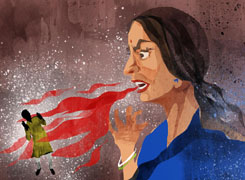How to Cope with an Abusive Father: A 28-Year-Old's Cry for Help
Anu Krishna |1745 Answers |Ask -Follow
Relationships Expert, Mind Coach - Answered on Dec 07, 2024
The co-founder of Unfear Changemakers LLP, she has received her neuro linguistic programming training from National Federation of NeuroLinguistic Programming, USA, and her energy work specialisation from the Institute for Inner Studies, Manila.
She is an executive member of the Indian Association of Adolescent Health.... more

Hello Ma'am. I hope you are doing well. I am not willing to disclose my name. I hail from a nuclear family comprising my parents and myself. I am 28. I was hesitating at first but I am suffering from severe mental agony. The cause of this is my father. My father is extremely volatile, getting aggressive and verbally violent in the smallest and most random of issues. I am an extremely peace loving person as my job as a teacher is demanding. My mother is very demure and prefers to do things hus way to maintain peace in the house. Whenever aggravated situations like this arise, and I have a debate or argument with my father, I generally keep my voice calm but hands and legs tremble and I have palpitations. I lose my semblance and become unable to place my opinions. When I see my father like this, I feel scared to the core. I start remembering the violent childhood beatings that I used to get for not able to cope with studies. I respect him but have realised that my love for him is long gone. The words that he spews verbally, add to my scar and trauma. My mother asks me to remain silent and let him calm down on his own. But the words scar me. I am increasingly becoming distant from my father. I am at a phase in life where I am earning but am not stable. Moreover I worry for my mother as I love her dearly. Can you suggest me how to cope with such a difficult situation? I am earnestly looking forward to your suggestions. Regards MR
There's little that you can do to change the dynamics of the relationship between your mother and father. Your mother chooses to be submissive and your father has also got used to being the decision maker and things work between them. So leave it at that.
Now, when it comes to you; you have a choice of going through it or doing something about it. You are 28; so what if you are not earning well...maybe stepping out of home will help you re-think and move to something better that lets you earn better as well. At times in life, strong decisions like these are life-changing and they must be made. Is this going to change the relationship between you and your father? No, it wont; but at least you have a chance at a life that you can build for yourself. It's time you grew into your own skin and at this moment if you don't do that for yourself, the rest of your life you will be playing the role of a victim and blaming your father for things not going well for you. You have a choice!
All the best!
Anu Krishna
Mind Coach|NLP Trainer|Author
Drop in: www.unfear.io
Reach me: Facebook: anukrish07/ AND LinkedIn: anukrishna-joyofserving/
Thank you for your kind words.
All the best!
Anu Krishna
Mind Coach|NLP Trainer|Author
Drop in: www.unfear.io
Reach me: Facebook: anukrish07/ AND LinkedIn: anukrishna-joyofserving/
You may like to see similar questions and answers below
Anu Krishna |1745 Answers |Ask -Follow
Relationships Expert, Mind Coach - Answered on Sep 06, 2021
Anu Krishna |1745 Answers |Ask -Follow
Relationships Expert, Mind Coach - Answered on Sep 22, 2022
Anu Krishna |1745 Answers |Ask -Follow
Relationships Expert, Mind Coach - Answered on Feb 08, 2023
Dr Ashish Sehgal | Answer |Ask -Follow
Relationships Expert, Mind Coach - Answered on Dec 21, 2024
Kanchan Rai |645 Answers |Ask -Follow
Relationships Expert, Mind Coach - Answered on Dec 07, 2024
Dr Dipankar Dutta |1837 Answers |Ask -Follow
Tech Careers and Skill Development Expert - Answered on Dec 05, 2025
Dr Shyam Jamalabad |108 Answers |Ask -Follow
Dentist - Answered on Dec 05, 2025
Dr Shyam Jamalabad |108 Answers |Ask -Follow
Dentist - Answered on Dec 05, 2025
Dr Shyam Jamalabad |108 Answers |Ask -Follow
Dentist - Answered on Dec 05, 2025
Dr Dipankar Dutta |1837 Answers |Ask -Follow
Tech Careers and Skill Development Expert - Answered on Dec 05, 2025
Ulhas Joshi |280 Answers |Ask -Follow
Mutual Fund Expert - Answered on Dec 05, 2025
Dr Dipankar Dutta |1837 Answers |Ask -Follow
Tech Careers and Skill Development Expert - Answered on Dec 04, 2025
Ravi Mittal |676 Answers |Ask -Follow
Dating, Relationships Expert - Answered on Dec 04, 2025
Anu Krishna |1745 Answers |Ask -Follow
Relationships Expert, Mind Coach - Answered on Dec 04, 2025
Anu Krishna |1745 Answers |Ask -Follow
Relationships Expert, Mind Coach - Answered on Dec 04, 2025



























